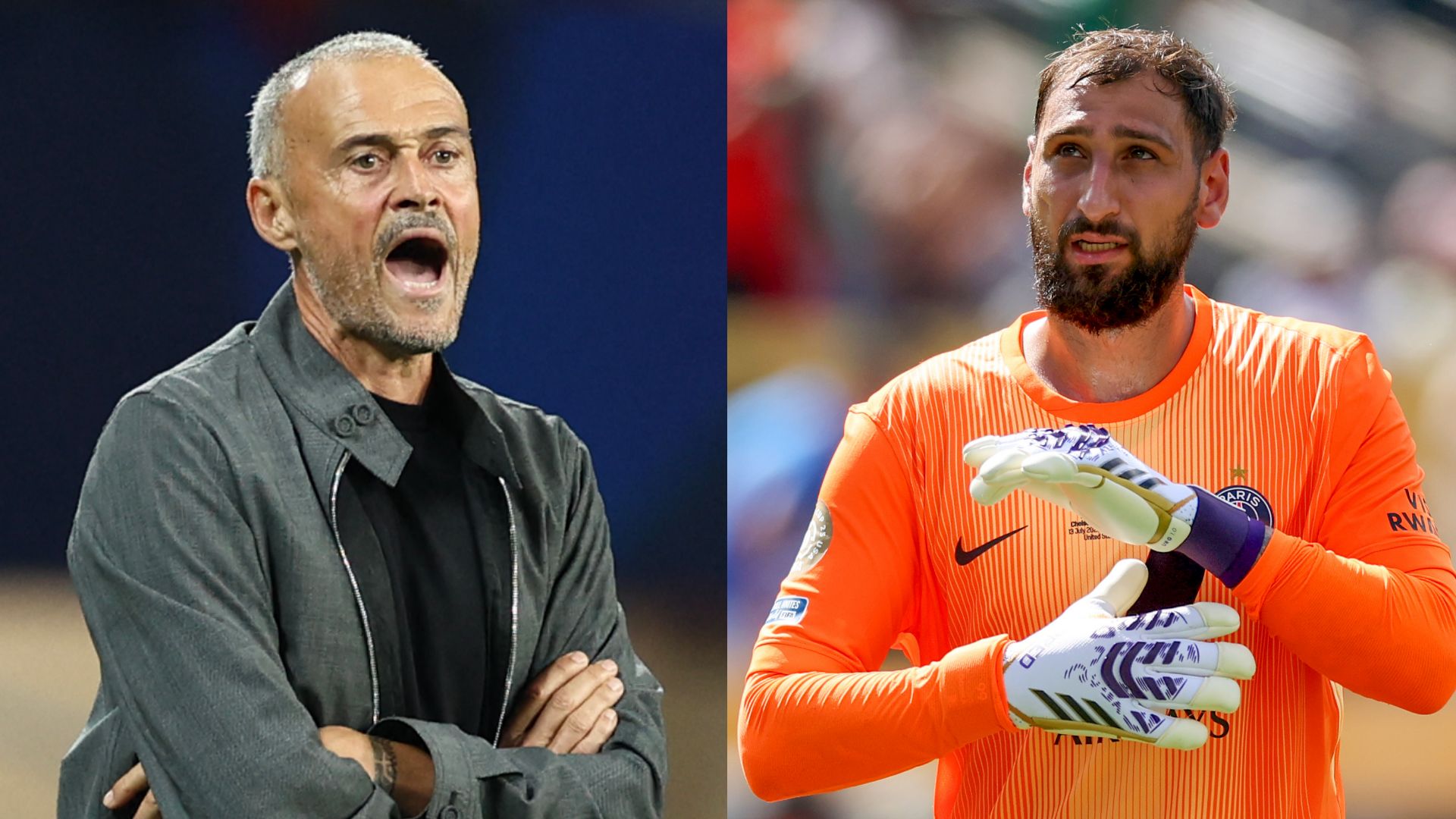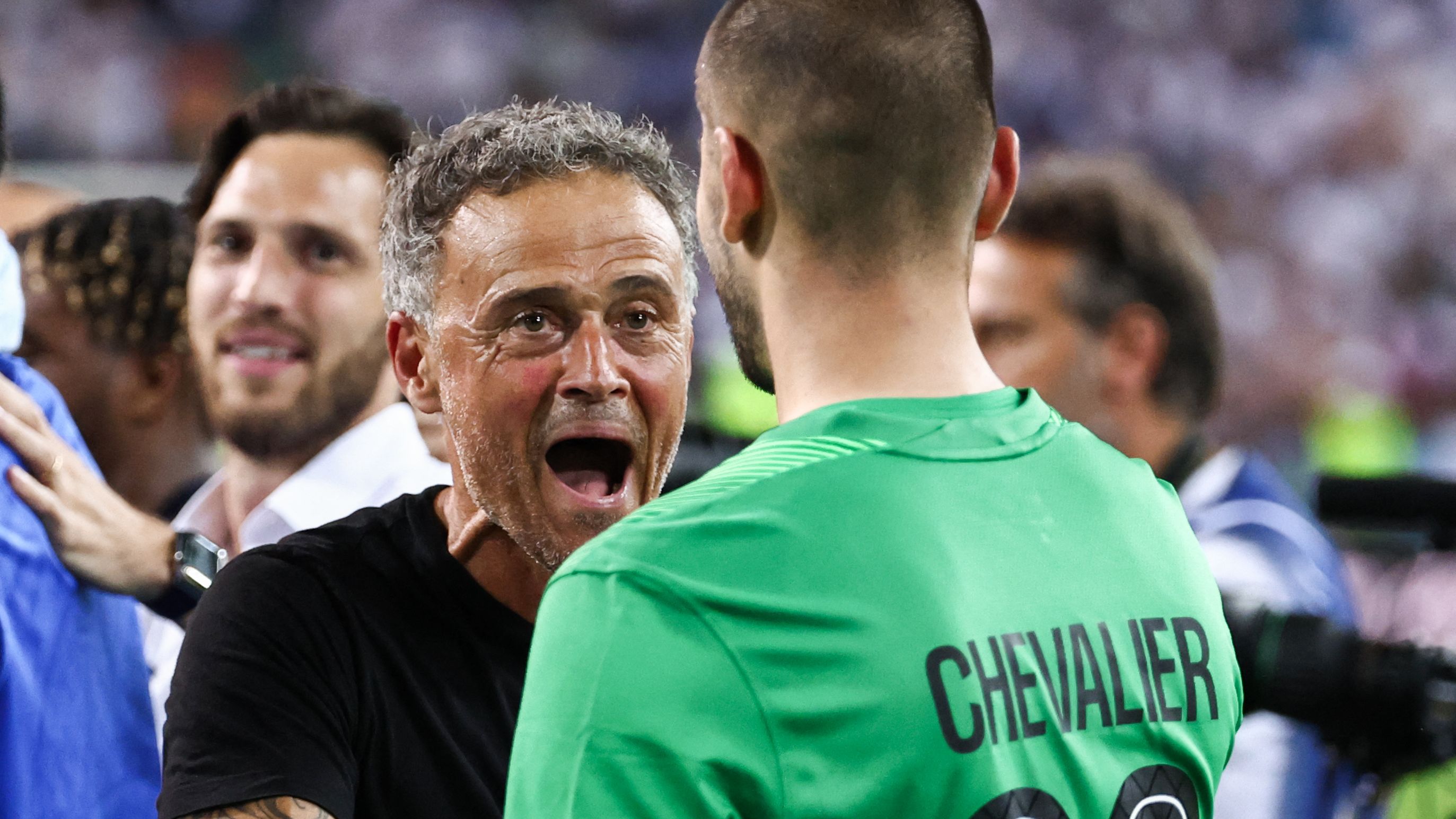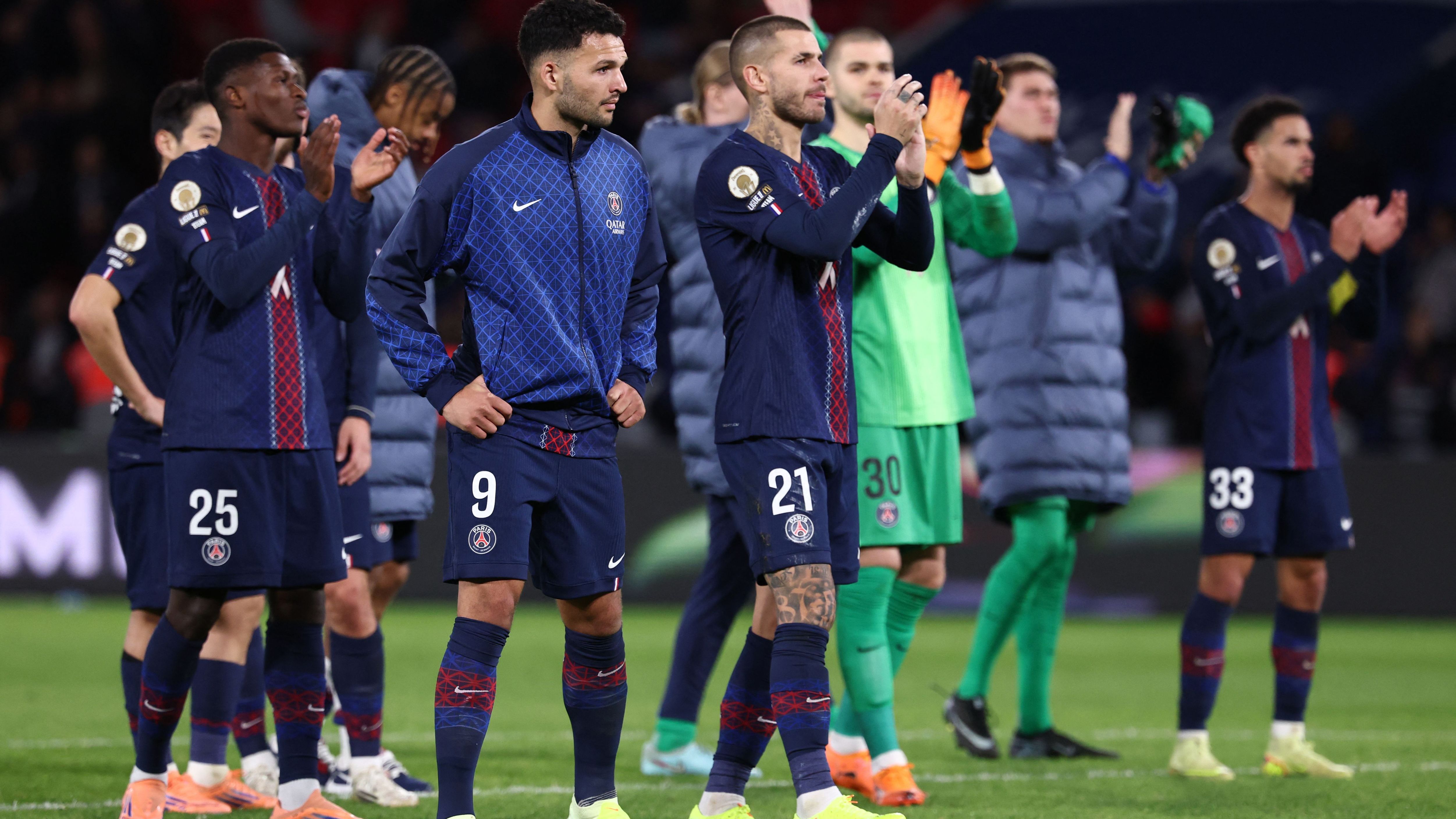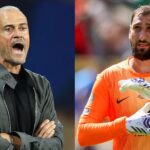Luis Enrique Backs PSG Goalkeeper Lucas Chevalier Amid Initial Challenges
PSG goalkeeper, the spotlight has intensified on Lucas Chevalier since his arrival, as the team’s choice to replace Gianluigi Donnarumma in the summer drew mixed reactions from analysts. Concerns arose that the Ligue 1 winners might not secure a keeper of equal caliber, and Chevalier’s rocky start, especially evident in the 3-3 draw versus Strasbourg, has fueled ongoing debates about his adaptation to the high-pressure environment in Paris.
The images below capture the intensity of the situation:



Expert Critiques Highlighting Chevalier’s Early Difficulties
Former goalkeeper Lionel Charbonnier offered his insights to RMC Sport, stressing that Chevalier is currently lacking the essential command in goal. “He’s not measuring up to expectations,” Charbonnier noted, explaining how an initial goal stemmed from a misjudgment in positioning; rather than moving forward confidently, he pulled back, resulting in a poorly timed attempt to block.
When discussing the subsequent goal, Charbonnier pointed out, “He tried to reach with his leg, but his footwear caught on the surface.” In general, he argued that the demands of the position are proving too much for Chevalier right now, a sharp contrast to his reliable outings at Lille where these issues didn’t surfaced. Moreover, Charbonnier commented on how Chevalier’s build makes the net seem overwhelmingly vast, exacerbating his on-field struggles.
Enrique’s Firm Endorsement of the Young Keeper
Luis Enrique, leading PSG, quickly came to his player’s defense. In preparation for the upcoming Champions League clash with Bayer Leverkusen, the former Barcelona coach voiced his complete satisfaction with Chevalier’s role, describing him as a premier option between the posts.
During his media briefing, Enrique shared, “Patterns repeat each season, and I’m genuinely satisfied with the advancements. Lucas Chevalier impresses me greatly-he ranks among the elite choices, potentially the very best. His performances have been remarkable, and our selections are always aimed at sustainable success.”
He further highlighted Chevalier’s attributes, adding, “His standout qualities include his personality and prowess in matches. We’re confident he’ll become a vital asset for the team moving forward. In my view, his showings so far match exactly what I anticipated, and that defines our focus.”
Enrique Tackles Media Pressure on PSG Keepers
In addition to protecting Chevalier, Luis Enrique challenged the media’s treatment of goalkeepers like him and Donnarumma, recognizing it as a standard challenge for stars at a club as prominent as PSG.
“He possesses the fortitude to endure it, as evidenced in training and competitions,” Enrique commented. “It’s remarkable how swiftly people overlook the ongoing attacks on Gigio Donnarumma over the years-it sticks with me! The media has been harsh on him for four years straight. To be just, even prior to my time at PSG, the criticism was constant. Being a goalkeeper for a powerhouse like Paris Saint-Germain means accepting this reality.”
Reflecting on Donnarumma’s Achievements and What’s Next
Donnarumma played a pivotal part in PSG‘s successful Champions League run last year and has secured the Men’s Yashin Trophy at the 2025 Ballon d’Or, making him a frontrunner for the Best Men’s Goalkeeper at the forthcoming Best FIFA Football Awards. At the same time, Manchester City capitalized on PSG‘s move to let go of the esteemed Italian, viewing it as a prime acquisition opportunity.
PSG’s Ongoing Champions League Campaign
PSG has begun their Champions League title protection with impressive victories against Barcelona andunikely and Atalanta. Their next challenge is against Bayer Leverkusen in Germany, as they push to hold onto their championship status.
The Story Behind Chevalier’s First Outing
In the competitive realm of professional soccer, newcomers often deal with overwhelming expectations in their initial appearances, and Lucas Chevalier’s entry for PSG at Parc des Princes exemplifies this. As an up-and-coming keeper entering a top-tier European setting, his efforts garnered widespread interest from the audience and commentators, revealing the hurdles of shifting from lower leagues to top-flight contests under Enrique’s guidance.
When Chevalier took his place in the starting eleven, it sparked both anticipation and doubt among PSG supporters, who expect exceptional play from their netminders. In that prominent game, he navigated numerous demanding scenarios, including defensive slips and aggressive rival offensives. Beyond the match results, this introduction focused on how a rookie copes with the glare at a stadium like Parc des Princes, renowned for its vibrant energy and exacting fans.
Challenges and Backlash for Chevalier’s Performance
Backlash in soccer arrives rapidly and without mercy, and Chevalier’s game was no different. Observers and online communities zeroed in on his mistakes, such as failing to secure important stops and issues with alignment against speedy strikers. Terms like “criticism of PSG goalkeeper” and “tough debut at Parc des Princes” rapidly gained popularity, heightening the adverse responses. This reaction points to a larger problem in athletics: the heavy judgment young competitors face, which can influence their self-assurance and future progress.
Within soccer, this kind of feedback typically arises from elevated standards, particularly for a team like PSG that’s constantly under scrutiny for Champions League goals. Supporters and experts drew unfavorable parallels between Chevalier and veteran players, doubting his preparedness and implying that PSG should turn to more seasoned keepers. Such responses are typical, as evidenced in other instances where rising stars encounter disapproval after one subpar performance.
Enrique’s Support and Links to Donnarumma’s Journey
Renowned for his tactical approach and defense of his players, Luis Enrique publicly stood by Chevalier, underlining the need for tolerance and backing for emerging talents. In his remarks after the game, Enrique pointed out that all keepers, even luminaries like Gianluigi Donnarumma, have dealt with rocky starts. By alluding to Donnarumma, who triumphed over initial obstacles, Enrique illustrated that perseverance is essential for thriving in soccer.
Enrique’s strategy not only countered the instant negativity but also strengthened PSG‘s dedication to developing new or acquired players. He noted that errors are integral to improvement, employing expressions like “supporting PSG goalkeeper during scrutiny” to connect with the fanbase. This backing transformed the discussion from outright criticism to one of advancement, showing that even celebrated figures like Donnarumma experienced difficulties before proving indispensable in critical matches.
Advantages of Supporting Emerging Talents in Soccer
Backing players like Chevalier brings multiple advantages to teams and the sport overall. It cultivates an atmosphere of growth in clubs, enabling prospects to enhance their confidence and abilities progressively. For PSG, supporting Chevalier might ensure enduring reliability in goal, minimizing the necessity for constant player changes and their expenses.
From the team’s viewpoint, this method can elevate spirits and foster unity, as athletes realize their contributions are appreciated despite early failures. Furthermore, for soccer followers, observing a young prospect’s evolution offers captivating narratives that sustain interest in the club’s story.
Helpful Strategies for Aspiring Keepers Dealing with Backlash
For young keepers or athletes confronting comparable pressures, consider these effective strategies to manage obstacles:
- Build Mental Strength: Use methods like meditation or note-taking to cope with feedback without impacting your play. Keep in mind, elite athletes like Donnarumma employ mental exercises to maintain concentration.
- Seek Productive Input: Communicate with trainers to convert negative remarks into chances for growth. Review your initial game recordings to pinpoint enhancements in areas such as agility or choices in tense moments.
- Utilize Available Resources: Connect with guides, colleagues, and loved ones for motivation. Enrique’s advocacy demonstrates how a powerful coach can sway public opinion favorably.
- Emphasize Skill Development: Add exercises that mimic competitive conditions, akin to those at Parc des Princes, to increase assurance in live games.
These recommendations, based on standard practices in professional soccer, can assist players like Chevalier in transforming early setbacks into pathways to achievement.
Historical Examples of Coach Support Leading to Success
Soccer’s past includes numerous examples where managers protected young athletes, resulting in impressive recoveries. Take, for instance, how Zinedine Zidane championed a young Kylian Mbappé at a leading club, helping him mature into a global sensation. Similarly, Arsène Wenger’s endorsement of Thierry Henry at Arsenal aided the forward in overcoming early inconsistencies and becoming a legend.
In relation to Chevalier, this echoes the ways coaches have traditionally shielded talents from excessive pressure. By citing Donnarumma’s evolution-from early critiques in Serie A to claiming top honors-Enrique’s tactics align with these examples, possibly setting the Dame for Chevalier’s advancement within PSG‘s ranks.
These instances prove that with appropriate mentorship, even the toughest introductions can evolve into enduring legacies, positioning Enrique’s approach as a wise choice for PSG‘s prospects.
Personal Stories from Coaches and Athletes in Soccer
From various interviews and memoirs, coaches and players recount experiences that mirror Enrique’s backing of Chevalier. For example, in Donnarumma’s memoir, he discussed his beginning challenges, explaining how positive guidance from his manager helped him sharpen his game and disregard social media critics. This account emphasizes the psychological impact of judgment and the importance of leadership in surmounting it.
Enrique, informed by his own history as both a player and coach, probably draws from analogous situations, such as guiding young teams at Barcelona. Through these accounts, we understand how the personal aspects of soccer-such as determination, guidance, and development-significantly shape professional paths, rendering Chevalier’s scenario a familiar tale for up-and-comers.
The Challenging Debut of Lucas Chevalier at Parc des Princes
In the fast-paced world of professional football, every debut can be a make-or-break moment, especially for a young goalkeeper like Lucas Chevalier stepping into the spotlight at PSG. During his first appearance at the iconic Parc des Princes, Chevalier faced intense scrutiny after a performance that drew mixed reactions from fans and critics alike. This event highlighted the pressures that come with defending the goal for a top club like Paris Saint-Germain, where expectations are sky-high.
Lucas Chevalier’s debut wasn’t exactly smooth sailing, as he encountered several challenging situations on the pitch. Goalkeepers in the French Ligue 1, particularly at PSG, often deal with high-stakes matches that test their reflexes, decision-making, and composure under pressure. Chevalier’s game included a few errors that led to goals, sparking widespread criticism from pundits and supporters who expected more from the emerging talent. This backlash is common in football, where even minor mistakes can go viral and amplify the negative feedback.
Key Moments from the Match
Let’s break down some of the pivotal moments that defined Chevalier’s debut. Early in the game, he made a couple of solid saves that showcased his potential, but a costly misjudgment on a cross allowed the opposition to score. This moment quickly became a talking point on social media and sports forums, with keywords like “PSG goalkeeper debut” trending as fans debated his readiness. Such incidents are part and parcel of a goalkeeper’s role, yet they often attract disproportionate criticism in the high-profile environment of the Parc des Princes.
Another aspect to consider is the overall team dynamics. PSG’s style of play, which emphasizes quick transitions and attacking football, can expose goalkeepers to more shots and counter-attacks. For Chevalier, adapting to this intensity as a newcomer meant facing a steep learning curve, making his performance a valuable learning experience for his future growth in elite football.
Luis Enrique’s Strong Defense of Lucas Chevalier
PSG manager Luis Enrique didn’t hold back in supporting his young goalkeeper amid the backlash. In post-match interviews, Enrique emphasized the importance of patience and perspective when evaluating a player’s early career, directly addressing the criticism head-on. He pointed out that every goalkeeper, including established stars, has faced similar hurdles in their journey.
Enrique specifically referenced Gianluigi Donnarumma, another high-profile goalkeeper who has had his share of ups and downs. By drawing parallels to Donnarumma’s experiences, Enrique highlighted how resilience and coaching support can turn initial setbacks into long-term success. This approach not only defended Chevalier but also reinforced the idea that criticism should be constructive rather than destructive in football development.
Referencing Donnarumma’s Journey for Context
To put things in perspective, let’s look at how Enrique tied in Donnarumma’s story. The Italian goalkeeper, known for his world-class saves, had a rocky start at certain points in his career, including adapting to new teams and high-pressure environments. Enrique used this as an example to show that even players like Donnarumma, who have won major titles, weren’t immune to early criticism. This reference added depth to Enrique’s defense, illustrating that Chevalier’s debut challenges are part of a broader narrative in professional goalkeeper careers.
By mentioning Donnarumma, Enrique aimed to humanize the situation, reminding everyone that growth takes time. It’s a smart strategy that aligns with modern football management, where mental health and player development are as important as tactical skills.
Benefits of Coach Support in Football
One of the standout elements in this story is the role of a coach like Luis Enrique in shielding players from undue pressure. Having a manager who publicly backs you can boost confidence and foster a positive team environment. For young athletes, this kind of support can translate to better performance in future games, as it reduces the fear of failure and encourages risk-taking on the pitch.
In football, the benefits extend beyond individual players. When coaches defend their squad publicly, it builds team morale and can even influence how fans perceive and interact with the players. This approach helps maintain a healthy club culture, where mistakes are seen as opportunities for growth rather than reasons for dismissal.
Practical Tips for Aspiring Goalkeepers
If you’re a young goalkeeper looking to navigate the pressures of the sport, here are some practical tips inspired by Chevalier’s experience and Enrique’s guidance:
- Focus on Mental Preparation: Before matches, practice visualization techniques to handle high-pressure scenarios. This can help you stay calm during debuts at venues like the Parc des Princes.
- Learn from Errors: Treat every mistake as a lesson. Review game footage with your coach to identify areas for improvement, just as Chevalier might be doing now.
- Seek Mentorship: Connect with experienced goalkeepers, like Donnarumma, through training camps or online resources. Their stories can provide real-world insights into overcoming criticism.
- Build Physical and Technical Skills: Work on core goalkeeper fundamentals, such as diving, positioning, and distribution, to reduce the chances of errors in competitive play.
- Cultivate Resilience: Develop a support network, including coaches and teammates, to handle negative feedback. Enrique’s defense shows how vital this can be for long-term success.
These tips aren’t just theoretical-they’re drawn from the realities of professional football and can help you stay motivated and perform at your best.
Case Studies: Similar Debut Experiences in Football
To make this article even more relatable, let’s explore a few case studies of other players who faced tough debuts but bounced back with the right support. For instance, consider Alphonse Areola, a former PSG goalkeeper whose early games were marked by criticism, yet he went on to become a key player for the club and represent France internationally. His story mirrors Chevalier’s, showing how perseverance and coaching guidance can lead to redemption.
Another example is Ederson at Manchester City, who had a challenging initial period after joining from Benfica. With backing from manager Pep Guardiola, Ederson overcame early doubts to become one of the Premier League’s top goalkeepers. These case studies demonstrate that first-hand experiences in football often involve setbacks, but with strong leadership like Luis Enrique’s, players can turn the tide.
In summary of these examples, the key takeaway is that every challenging debut, whether at Parc des Princes or elsewhere, can be a stepping stone if handled with the right mindset and support.
First-Hand Experience Insights
Drawing from broader observations in the football world, many coaches and players share that public defenses like Enrique’s can create lasting impacts. For Chevalier, this moment could be a turning point, much like how Donnarumma’s career progressed after his own hurdles. These insights underscore the importance of fostering a supportive ecosystem in sports, ensuring that talents like PSG’s young goalkeeper get the chance to shine.









